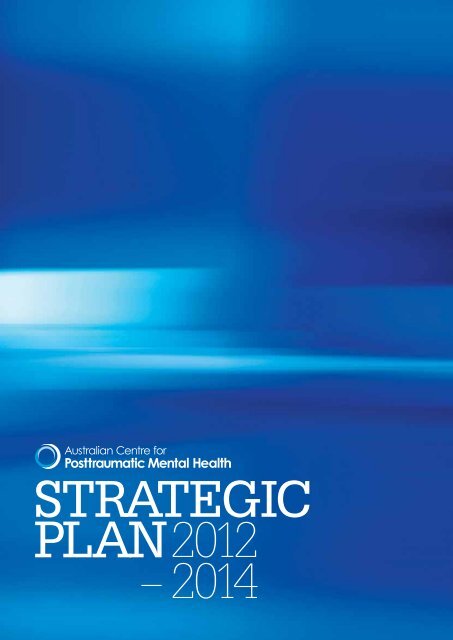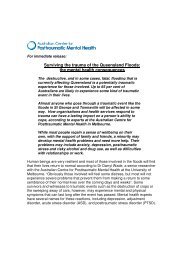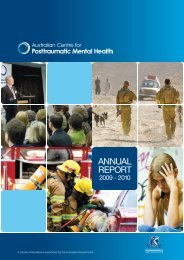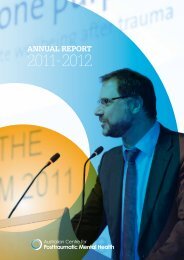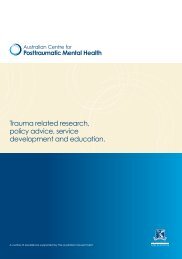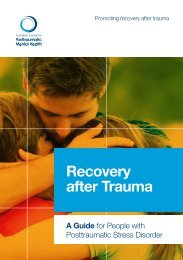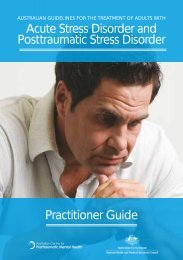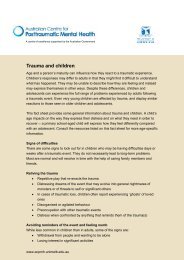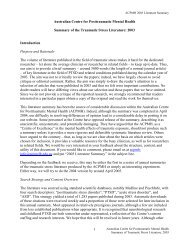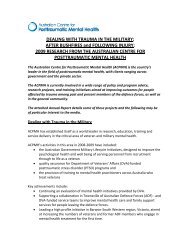Untitled - Australian Centre for Posttraumatic Mental Health
Untitled - Australian Centre for Posttraumatic Mental Health
Untitled - Australian Centre for Posttraumatic Mental Health
You also want an ePaper? Increase the reach of your titles
YUMPU automatically turns print PDFs into web optimized ePapers that Google loves.
Strategic<br />
plan 2012<br />
– 2014
Introduction<br />
The <strong>Australian</strong> <strong>Centre</strong> <strong>for</strong><br />
<strong>Posttraumatic</strong> <strong>Mental</strong> <strong>Health</strong><br />
(ACPMH) Strategic Plan<br />
2012-2014 sets the focus<br />
and direction <strong>for</strong> ACPMH<br />
as we continue to build our<br />
expertise and reputation<br />
with respect to creating,<br />
understanding, translating,<br />
and applying knowledge to<br />
improving wellbeing and<br />
quality of life <strong>for</strong> individuals<br />
and communities who<br />
experience trauma.<br />
Our Strategic Plan 2012-2014 will guide our<br />
decisions and help us to measure our success.<br />
Our key partners in achieving our goals are<br />
the Departments of Veterans’ Affairs and<br />
Defence and the University of Melbourne.<br />
With a strong foundation established over<br />
many years, our collaborative partnerships<br />
contribute to improvements in policy and<br />
practice in posttraumatic mental health.<br />
In the coming years ACPMH will continue to work<br />
closely with the Departments of Veterans’ Affairs<br />
and Defence – supporting them to achieve their<br />
strategic and corporate goals. ACPMH is in a<br />
unique position to facilitate an integrated approach<br />
to prevention, support and treatment – helping<br />
Australia to remain at the <strong>for</strong>efront of world’s<br />
best practice in veteran and military care.<br />
We will continue to build our capability and<br />
expand our influence in the community to promote<br />
the best possible outcomes <strong>for</strong> survivors of<br />
disaster, employees in high risk organisations<br />
and community members affected by trauma.<br />
A new leadership structure at ACPMH will<br />
support the delivery of the new strategic plan.<br />
The appointment of Professor David Forbes to<br />
the role of Director and Sue Scheinpflug to the<br />
newly established position of CEO provides a<br />
shared leadership approach to our operations<br />
and strategic direction.<br />
Michael Vitale<br />
Chair<br />
The Strategic Plan 2012-2014 has been developed<br />
with input from our staff, our stakeholders and<br />
the Board. Their contributions and shared vision<br />
<strong>for</strong> ACPMH ensure our continued commitment<br />
to making a difference to the lives of people who<br />
have experienced trauma.<br />
ACPMH Strategic Plan 2012-2014
Our vision<br />
Improved wellbeing<br />
and quality of life<br />
<strong>for</strong> individuals and<br />
communities who<br />
experience trauma.<br />
Our mission<br />
To be an international<br />
leader in building<br />
the capability<br />
of individuals,<br />
organisations and<br />
the community to<br />
understand, prevent<br />
and recover from the<br />
adverse mental health<br />
effects of trauma.<br />
Our goals<br />
goal 1<br />
Improve outcomes <strong>for</strong> the community<br />
In collaboration with our partners, ACPMH<br />
will improve the quality, effectiveness and<br />
accessibility of services and interventions<br />
<strong>for</strong> survivors of disaster, workers in high risk<br />
organisations, and community members<br />
affected by trauma<br />
goal 2<br />
Improve outcomes <strong>for</strong> members<br />
of the Defence community<br />
In collaboration with the Departments of<br />
Veterans’ Affairs and Defence, ACPMH<br />
will continue to contribute to the quality<br />
and effectiveness of military mental health<br />
services <strong>for</strong> past and present members of<br />
the Defence community<br />
goal 3<br />
Advance scientific knowledge about<br />
the nature, development and impact<br />
of traumatic stress<br />
ACPMH will continue to undertake high<br />
impact research that in<strong>for</strong>ms the prevention,<br />
treatment and recovery from the<br />
psychological effects of trauma<br />
goal 4<br />
Provide leadership and expertise<br />
ACPMH will work with government, other<br />
organisations and the community as a<br />
leading authority on evidence-in<strong>for</strong>med<br />
posttraumatic mental health policy, service<br />
delivery and practice<br />
goal 5<br />
Enhance the operational and business<br />
capabilities of the organisation<br />
ACPMH will develop systems and processes<br />
to improve the efficient and effective use of<br />
our people and resources<br />
ACPMH Strategic Plan 2012-2014
<strong>Posttraumatic</strong><br />
<strong>Mental</strong> <strong>Health</strong><br />
Up to 65 per cent of <strong>Australian</strong>s<br />
are likely to experience or<br />
witness an event which<br />
threatens their life or safety,<br />
or that of others around them. 1<br />
This may be a car or other<br />
serious accident, physical or<br />
sexual assault, war or torture,<br />
or natural disaster such as<br />
a bushfire. Almost everyone<br />
who goes through such<br />
a traumatic event will be<br />
emotionally affected in<br />
some way.<br />
Emotional recovery from a traumatic event is as<br />
important as physical recovery. Yet, we can overlook<br />
a person’s mental health in the aftermath of a<br />
traumatic event, particularly when they have serious<br />
physical injuries that need immediate treatment.<br />
Psychological First Aid is the preferred initial<br />
response. Assistance provided in the first few days<br />
following a traumatic event should involve practical<br />
and emotional support, provision of in<strong>for</strong>mation and<br />
ongoing monitoring, tailored to individual needs. 2<br />
<strong>Health</strong> practitioners should encourage people<br />
affected by traumatic events to seek the support<br />
of family, friends and community groups. Structured<br />
psychological debriefing should not be offered on<br />
a routine basis. 3<br />
Help following a traumatic event does not have to<br />
come from a health professional. Most people will<br />
recover on their own, with the support of family and<br />
friends. How people adapt to stressful life events and<br />
the support they receive from others are important<br />
<strong>for</strong> recovery. It is important that people involved in<br />
traumatic events use their own coping resources and<br />
the support systems most readily available to them.<br />
ACPMH Strategic Plan 2012-2014
For example, if someone uses exercise to deal with<br />
stress, this may also be helpful in managing tension<br />
following a traumatic event. There is no standard recipe<br />
<strong>for</strong> how people cope with trauma. Each person has a<br />
unique way of recovering and should be supported in<br />
using strategies and resources that suit them and that<br />
are readily available.<br />
People who do not appear to “bounce back” within<br />
the first couple of weeks, or develop concerns about<br />
their mental health and wellbeing, may benefit from<br />
professional help to assist their recovery. A number<br />
of mental health problems can arise following trauma,<br />
including anxiety, depression, posttraumatic stress<br />
disorder (PTSD) and risky alcohol and drug use,<br />
together with difficulties with relationships, work or<br />
study. These problems can also have a significant<br />
impact on the person’s family and friends. A doctor<br />
or mental health professional can identify what the<br />
problem is and what to do about it. If possible, family<br />
members’ needs <strong>for</strong> care should also be considered<br />
alongside the needs of the person with mental<br />
health problems. The impact of mental health<br />
problems can be minimised with early intervention,<br />
but it is never too late to ask <strong>for</strong> help.<br />
Effective treatments are available and talking to<br />
a doctor is a good place to start. Treatment can<br />
involve both psychological assistance and medication.<br />
The cornerstone of treatment <strong>for</strong> PTSD involves<br />
confronting the traumatic memory, and addressing<br />
any unhelpful thoughts and beliefs associated with<br />
the experience.<br />
The <strong>Australian</strong> <strong>Centre</strong> <strong>for</strong> <strong>Posttraumatic</strong> <strong>Mental</strong><br />
<strong>Health</strong> aims to improve the wellbeing and quality<br />
of life of people affected by trauma, through<br />
research, the development of best practice<br />
guidelines, improvement of health services<br />
and organisational mental health practices,<br />
practitioner training, and increasing community<br />
understanding about the impact of trauma.<br />
1 Creamer, M., Burgess, P., & McFarlane, A. (2001) <strong>Posttraumatic</strong> stress disorder: Findings from the <strong>Australian</strong> National<br />
Survey of <strong>Mental</strong> <strong>Health</strong> and Well-Being. Psychological Medicine, 31(7), 1237-1247.<br />
2 Forbes, D., Creamer, M., Bisson, J., Cohen, J., Crowe, B., Foa, E., Friedman, M., Keane, T., Kudler, H., & Ursano, R. (2010).<br />
A guide to guidelines <strong>for</strong> the treatment of PTSD and related conditions. Journal of Traumatic Stress, 23(5), 537-552.<br />
3 ACPMH. (2007). <strong>Australian</strong> Guidelines <strong>for</strong> the Treatment of Adults with Acute Stress Disorder and <strong>Posttraumatic</strong> Stress<br />
Disorder. Melbourne: ACPMH.<br />
ACPMH Strategic Plan 2012-2014
<strong>Australian</strong> <strong>Centre</strong> <strong>for</strong><br />
<strong>Posttraumatic</strong> <strong>Mental</strong> <strong>Health</strong><br />
The <strong>Australian</strong> <strong>Centre</strong> <strong>for</strong> <strong>Posttraumatic</strong> <strong>Mental</strong><br />
<strong>Health</strong> is a not-<strong>for</strong>-profit organisation dedicated<br />
to reducing the impact of trauma by building the<br />
capability of individuals, organisations and the<br />
community to understand, prevent and recover<br />
from the adverse mental health effects of trauma.<br />
ACPMH is governed by a Board of Management<br />
which brings together independent members,<br />
representatives of our key partners: the<br />
Departments of Veterans’ Affairs and Defence<br />
and the University of Melbourne, and the<br />
executive positions of Director and CEO.<br />
The team at ACPMH is multi-disciplinary. Staff<br />
are experts in their respective fields, and many<br />
are internationally recognised <strong>for</strong> their work in<br />
posttraumatic mental health.<br />
World Class Research<br />
Our program of research and evaluation<br />
aims to advance the knowledge of trauma<br />
and posttraumatic mental health. Our<br />
leadership in translating research into<br />
education and training initiatives and policy<br />
and service development advice promotes<br />
the best possible outcomes <strong>for</strong> people<br />
affected by trauma.<br />
Policy and Service<br />
Development<br />
Our work with organisations that have<br />
responsibility <strong>for</strong> people affected by trauma<br />
aims to ensure that proven interventions in<br />
posttraumatic mental health are promoted<br />
through their policies and practice.<br />
Education and Training<br />
We research, develop and deliver education<br />
and training programs on mental health and<br />
posttraumatic mental health.<br />
Events and Resources<br />
We develop and disseminate in<strong>for</strong>mation<br />
about mental health and posttraumatic<br />
mental health through publications,<br />
resources, articles, conferences, <strong>for</strong>ums,<br />
symposia and in<strong>for</strong>med media commentary.<br />
ACPMH Strategic Plan 2012-2014
Our history<br />
ACPMH was established in 1995<br />
as the National <strong>Centre</strong> <strong>for</strong> War-Related<br />
<strong>Posttraumatic</strong> Stress Disorder (PTSD)<br />
in collaboration with the University<br />
of Melbourne and the Austin and<br />
Repatriation Medical <strong>Centre</strong> (now<br />
known as Austin <strong>Health</strong>).<br />
Funding support was provided by the <strong>Australian</strong> Government<br />
Department of Veterans’ Affairs (DVA). The organisation’s original<br />
focus was to improve the recognition and treatment of PTSD<br />
and related conditions within the veteran population.<br />
Over the past 17 years the organisation has grown and diversified<br />
into other areas of trauma-related mental health. ACPMH’s increased<br />
standing in trauma research, training and leadership is reflected in<br />
its income growth from around $2 million in 2002 to over $4 million<br />
in 2011.<br />
Our commitment to working in partnership with the Departments<br />
of Veterans’ Affairs and Defence to improve the mental health and<br />
wellbeing of past and present members of the Defence community<br />
remains core to our business. This commitment has seen a<br />
continued expansion of our focus and ef<strong>for</strong>ts to cover the full range<br />
of trauma-related mental health problems in veterans, serving<br />
personnel and their families.<br />
New areas of work <strong>for</strong> ACPMH over recent years have focussed<br />
on improving the recognition and treatment of trauma-related mental<br />
health problems within the general community. This has included<br />
the mental health needs of individuals and communities following<br />
accidents, violent crime, terrorism and natural disasters, as well as<br />
education and training programs <strong>for</strong> health professionals, government<br />
agencies, other organisations and the community in general.<br />
ACPMH Strategic Plan 2012-2014
Our Strategic Framework<br />
Our Vision<br />
Improved wellbeing and quality of life <strong>for</strong> individuals and communities who experience trauma<br />
OUR MISSION<br />
To be an international leader in building the capability of individuals, organisations and the<br />
community to understand, prevent and recover from the adverse mental health effects of trauma<br />
OUR GOALS<br />
Goal 1 Goal 2 Goal 3 Goal 4 Goal 5<br />
Improve outcomes<br />
<strong>for</strong> the community<br />
In collaboration with<br />
our partners, ACPMH<br />
will improve the quality,<br />
effectiveness and<br />
accessibility of services<br />
and interventions <strong>for</strong><br />
survivors of disaster,<br />
workers in high risk<br />
organisations, and<br />
community members<br />
affected by trauma<br />
Improve outcomes<br />
<strong>for</strong> members of<br />
the Defence<br />
community<br />
In collaboration with the<br />
Departments of Veterans’<br />
Affairs and Defence,<br />
ACPMH will continue to<br />
contribute to the quality<br />
and effectiveness of<br />
military mental health<br />
services <strong>for</strong> past and<br />
present members of the<br />
Defence community<br />
Advance scientific<br />
knowledge<br />
about the nature,<br />
development<br />
and impact of<br />
traumatic stress<br />
ACPMH will continue to<br />
undertake high impact<br />
research that in<strong>for</strong>ms the<br />
prevention, treatment<br />
and recovery from the<br />
psychological effects of<br />
trauma<br />
Provide leadership<br />
and expertise<br />
ACPMH will work with<br />
government, other<br />
organisations and the<br />
community as a leading<br />
authority on evidencein<strong>for</strong>med<br />
posttraumatic<br />
mental health policy,<br />
service delivery and<br />
practice<br />
Enhance the<br />
operational<br />
and business<br />
capabilities of<br />
the organisation<br />
ACPMH will develop<br />
systems and processes<br />
to improve the efficient<br />
and effective use of our<br />
people and resources<br />
Our services and products<br />
World Class Research<br />
Policy and Service<br />
Development<br />
Education and Training<br />
Events and Resources<br />
Our business strategies<br />
New<br />
Business<br />
Services and<br />
Products<br />
Governance<br />
Stakeholder<br />
Relations<br />
Strategic<br />
Planning and<br />
Leadership<br />
Processes<br />
and Systems<br />
Our<br />
People<br />
Sustainable<br />
Results<br />
Our values<br />
Social Responsibility<br />
Quality<br />
External Relationships<br />
Internal Cohesion<br />
Business Practices<br />
ACPMH Strategic Plan 2012-2014
Our business Strategies<br />
To achieve our goals, maintain our position as a leading research centre, and continue<br />
to excel in meeting the needs of our clients and the <strong>Australian</strong> community, ACPMH has<br />
adopted eight business strategies. These strategies have been adapted from the <strong>Australian</strong><br />
Business Excellence Framework and are applied across the delivery of our services in the<br />
achievement of our goals and those of our key clients and stakeholders. 4<br />
New business<br />
We will leverage off our position<br />
and capabilities to offer our services to a<br />
wider range of organisations, communities<br />
and individuals experiencing the adverse<br />
effects of trauma.<br />
Services and products<br />
We will produce world class research,<br />
work alongside our clients to deliver expert<br />
policy and service development advice,<br />
develop and deliver expert education<br />
and training programs <strong>for</strong> practitioners<br />
and service providers, and develop clear<br />
and in<strong>for</strong>mative resources and media<br />
commentary to advance the knowledge<br />
of trauma and posttraumatic mental health<br />
in organisations and the wider community.<br />
Governance<br />
We will ensure the focus of our governance<br />
strategies is on leadership, vision and<br />
continuous improvement at the highest<br />
level in ACPMH. We will achieve this by<br />
continuously learning, providing guidance<br />
and management, inclusive decision making<br />
and accountable processes and policies.<br />
Strategic planning<br />
and leadership<br />
We will provide effective and visible<br />
leadership, clarity of direction and sound<br />
management practices, built upon a<br />
foundation of a shared ownership of our<br />
vision, strategic direction, and values.<br />
Processes and systems<br />
We will review and improve our processes<br />
and systems to support the effective and<br />
efficient delivery of our services.<br />
Our people<br />
We will attract and retain the best people,<br />
and provide a workplace that enables the<br />
creation and delivery of high quality outcomes<br />
<strong>for</strong> our clients, on time and to budget.<br />
Sustainable results<br />
We will be transparent and accountable<br />
in our routine monitoring and reporting<br />
of our organisational per<strong>for</strong>mance.<br />
Stakeholder relations<br />
We will engage with our key clients, partners<br />
and stakeholders to shape the focus and<br />
scope of our work, in order to achieve<br />
mutually beneficial and agreed outcomes.<br />
4 SAI Global, (2011) GB002-2011 The <strong>Australian</strong> Business Excellence Framework,<br />
SAI Global: Sydney.<br />
ACPMH Strategic Plan 2012-2014
Our goals and strategies<br />
Goal 1<br />
Improve outcomes<br />
<strong>for</strong> the community<br />
In collaboration with<br />
our partners, ACPMH<br />
will improve the quality,<br />
effectiveness and<br />
accessibility of services<br />
and interventions <strong>for</strong><br />
survivors of disaster,<br />
workers in high risk<br />
organisations, and<br />
community members<br />
affected by trauma<br />
Strategies<br />
New business<br />
1.1 Continue to research levels of demand <strong>for</strong> posttraumatic<br />
mental health policy, research and practice across state,<br />
territory and federal government agencies, the not-<strong>for</strong>-profit<br />
sector and private organisations<br />
1.2 Foster new opportunities <strong>for</strong> collaboration and joint ventures<br />
through existing and new partnerships<br />
1.3 Increase operations and contributions in specific traumaaffected<br />
populations, such as children, families, the aged,<br />
and high risk organisations<br />
1.4 Expand the delivery of innovative, strategically relevant<br />
programs in our key areas of research and evaluation,<br />
policy and service development, education and training<br />
Outcomes<br />
An increasing number of survivors of disaster have access to evidence-based interventions that will help to<br />
reduce the impact of their trauma.<br />
An increasing number of adult, aged and child and adolescent mental health practitioners across Australia<br />
are trained to deliver evidence-based trauma interventions.<br />
Employees of high risk organisations have knowledge of and access to best practice approaches to<br />
prevention and early intervention, thereby reducing the impact of their trauma.<br />
Children and adolescents affected by trauma have access to child-focussed, evidence-based interventions<br />
and support through schools and local health and mental health providers.<br />
ACPMH Strategic Plan 2012-2014
Goal 2<br />
Improve outcomes<br />
<strong>for</strong> members<br />
of the Defence<br />
community<br />
In collaboration with the<br />
Departments of Veterans’<br />
Affairs and Defence,<br />
ACPMH will continue to<br />
contribute to the quality<br />
and effectiveness of<br />
military mental health<br />
services <strong>for</strong> past and<br />
present members of the<br />
Defence community<br />
Strategies<br />
SERVICES AND PRODUCTS<br />
2.1 Work with the Departments of Veterans’ Affairs and Defence<br />
to identify areas of greatest need<br />
2.2 Work with the Departments of Veterans’ Affairs and Defence<br />
to develop an integrated approach supporting the physical<br />
and mental health and wellbeing of the veteran and Defence<br />
communities<br />
2.3 Engage with the Departments of Veterans’ Affairs and Defence<br />
to provide education and training to improve the general mental<br />
health of past and present members of the Defence community<br />
and their families<br />
2.4 Conduct innovative, strategically relevant, fully funded research<br />
and evaluation projects in veteran and military populations<br />
2.5 In partnership with the Departments of Veterans’ Affairs and<br />
Defence, develop an agreed monitoring and evaluation<br />
framework <strong>for</strong> ensuring quality program and project outcomes<br />
are achieved on cost and on time<br />
Outcomes<br />
Alignment of ACPMH’s outcomes and strategies with the mental health and wellbeing policies and strategies<br />
of the Departments of Veterans’ Affairs and Defence.<br />
Veterans seeking care through mental health services provided or contracted by the Department of Veterans’<br />
Affairs will receive best practice care, improving their wellbeing and quality of life.<br />
Defence personnel will receive best practice mental health care through the Defence mental health delivery<br />
service, improving their wellbeing and quality of life.<br />
ACPMH Strategic Plan 2012-2014
Goal 3<br />
Advance scientific<br />
knowledge<br />
about the nature,<br />
development<br />
and impact of<br />
traumatic stress<br />
ACPMH will continue to<br />
undertake high impact<br />
research that in<strong>for</strong>ms the<br />
prevention, treatment<br />
and recovery from the<br />
psychological effects of<br />
trauma<br />
Strategies<br />
SERVICES AND PRODUCTS<br />
3.1 Strengthen collaboration and research partnerships with<br />
selected high profile, national and international research<br />
organisations<br />
3.2 Continue to focus on improving the understanding of the<br />
nature of traumatic stress, and refining assessment and<br />
intervention methodologies<br />
3.3 Work closely with relevant federal, state and territory<br />
governments and departments to improve the psychosocial<br />
response to disaster and terrorism<br />
3.4 Build research profile and influence through hosting and/or<br />
contributing to national and international conferences<br />
and publications<br />
3.5 Promote research careers in the area of trauma to<br />
postgraduate students<br />
Outcomes<br />
ACPMH’s reputation as an International <strong>Centre</strong> of Excellence in traumatic stress interventions is<br />
strengthened through research at the highest level.<br />
ACPMH’s research in<strong>for</strong>ms posttraumatic mental health policy and practice.<br />
ACPMH Strategic Plan 2012-2014
Goal 4<br />
Provide leadership<br />
and expertise<br />
ACPMH will work with<br />
government, other<br />
organisations and the<br />
community as a leading<br />
authority on evidencein<strong>for</strong>med<br />
posttraumatic<br />
mental health policy,<br />
service delivery and<br />
practice<br />
Strategies<br />
Governance<br />
4.1 Monitor and maintain an effective model of governance<br />
incorporating membership of key partner agencies<br />
4.2 Assess and monitor the external environment and risk<br />
framework in which ACPMH operates<br />
4.3 Apply the expertise, networks and knowledge of the Board<br />
to the governance and the leadership of the organisation<br />
STAKEHOLDER RELATIONS<br />
4.4 Develop and deliver a planned and targeted external<br />
communications and marketing strategy to strengthen the<br />
national profile and influence of ACPMH as a leader in<br />
research, training, and policy and service improvement<br />
advice in posttraumatic mental health<br />
4.5 Build strong networks and relationships with leaders and<br />
decision-makers in critical incident, emergency services, high<br />
risk organisations and natural disaster recovery agencies<br />
STRATEGIC PLANNING AND LEADERSHIP<br />
4.6 Continue to improve planning and decision-making processes,<br />
consistent with organisational values to ensure cooperative<br />
and inclusive engagement of staff<br />
4.7 Ensure that business improvement strategies are researched,<br />
developed, implemented and evaluated<br />
4.8 Implement an annual planning and reporting cycle aligned to<br />
the goals of the Strategic Plan<br />
Outcomes<br />
ACPMH maintains a strong, stable Board, focussed on governance and strategy.<br />
Key stakeholders are engaged and have robust and productive relationships with ACPMH.<br />
ACPMH is recognised <strong>for</strong> its innovation and creativity in service delivery.<br />
ACPMH Strategic Plan 2012-2014
Goal 5<br />
Enhance the<br />
operational<br />
and business<br />
capabilities of<br />
the organisation<br />
ACPMH will develop<br />
systems and processes<br />
to improve the efficient<br />
and effective use of our<br />
people and resources<br />
Strategies<br />
PROCESSES AND SYSTEMS<br />
5.1 Review current financial, project management and in<strong>for</strong>mation<br />
management systems to determine a future model <strong>for</strong> effective<br />
system integration, business monitoring and management<br />
5.2 Improve resource and asset management, including in<strong>for</strong>mation<br />
technology capabilities to meet current and future needs<br />
5.3 Use a range of contemporary technologies to ensure regular<br />
and effective internal and external dissemination of our work<br />
and capabilities<br />
OUR PEOPLE<br />
5.4 Establish clear roles, responsibilities and lines of reporting and<br />
supervision with KPIs aligned to goals <strong>for</strong> all staff<br />
5.5 Create cross-functional capabilities within ACPMH to<br />
deliver integrated, inter-disciplinary approaches to project<br />
management and delivery<br />
5.6 Monitor and contribute to staff wellbeing through regular<br />
supervision, feedback, support and communication<br />
5.7 Assist staff to expand their skill base and professionally develop<br />
through access to opportunities within the scope, structure<br />
and resources of the organisation<br />
SUSTAINABLE RESULTS<br />
5.8 Devise and apply key strategic metrics and financial indicators<br />
to monitor and report on organisational per<strong>for</strong>mance<br />
5.9 Maintain accurate budgeting processes, streamlined and timely<br />
reporting and acquittal procedures<br />
Outcomes<br />
ACPMH will have established and achieved annual surplus and revenue targets.<br />
Improved efficiency of project staff through better project allocation and management.<br />
Improved overhead functions of the organisation and agreed targets met.<br />
All key capabilities are in place, and staff are engaged, satisfied and enabled.<br />
A culture of accountability, with clear benchmarks, targets and processes to track progress <strong>for</strong> each goal.<br />
ACPMH Strategic Plan 2012-2014
Work with us to reduce the effects of trauma<br />
Expertise<br />
ACPMH’s scope and expertise in posttraumatic<br />
mental health is holistic and integrated. Our expertise<br />
encompasses theory, research, evidence-based<br />
policy development, practice guideline development,<br />
education and training, service development and<br />
implementation, evaluation and review.<br />
AAP Image/Julian Smith<br />
Integrated APPROACH<br />
ACPMH actively integrates learnings from all of its<br />
activities, to ensure that clients and the community<br />
benefit from the most up-to-date and best in<strong>for</strong>med<br />
knowledge of posttraumatic mental health.<br />
Leadership<br />
As a centre of excellence supported by the <strong>Australian</strong><br />
Government, ACPMH is recognised as one of the<br />
leading specialists in posttraumatic mental health.<br />
Our people include experienced clinicians, researchers,<br />
and academic leaders. We benefit from our extensive<br />
national and international research relationships.<br />
RECOGNISED STANDARDS<br />
ACPMH develops and publishes best practice clinical<br />
guidelines and creates internationally endorsed training<br />
resources <strong>for</strong> health professionals and communities.<br />
Our acclaimed programs of research in<strong>for</strong>m all of our<br />
work and set standards in the field of posttraumatic<br />
mental health.<br />
COLLABORATION<br />
ACPMH works collaboratively with our clients and<br />
partners, delivering best practice solutions to achieve<br />
their goals and exceed their expectations.<br />
AAP Image/POOL, Herald Sun<br />
partnerships<br />
ACPMH has long-established partnerships with<br />
the Departments of Veterans’ Affairs and Defence<br />
to develop an integrated approach to support the<br />
physical and mental health and wellbeing of the<br />
veteran and Defence communities.<br />
Results<br />
ACPMH’s vision and primary motivation is to improve<br />
the wellbeing and quality of life of people who<br />
experience trauma. We measure our success by the<br />
positive and enduring impact our work has on those<br />
affected by traumatic events.
Work with us to reduce the effects of trauma<br />
For more in<strong>for</strong>mation visit<br />
www.acpmh.unimelb.edu.au<br />
Level 1, 340 Albert Street<br />
East Melbourne VIC 3002<br />
Phone: 03 9936 5100<br />
acpmh-info@unimelb.edu.au<br />
<strong>Australian</strong> <strong>Centre</strong> <strong>for</strong> <strong>Posttraumatic</strong> <strong>Mental</strong> <strong>Health</strong> Inc<br />
ABRN: 095 202 994


